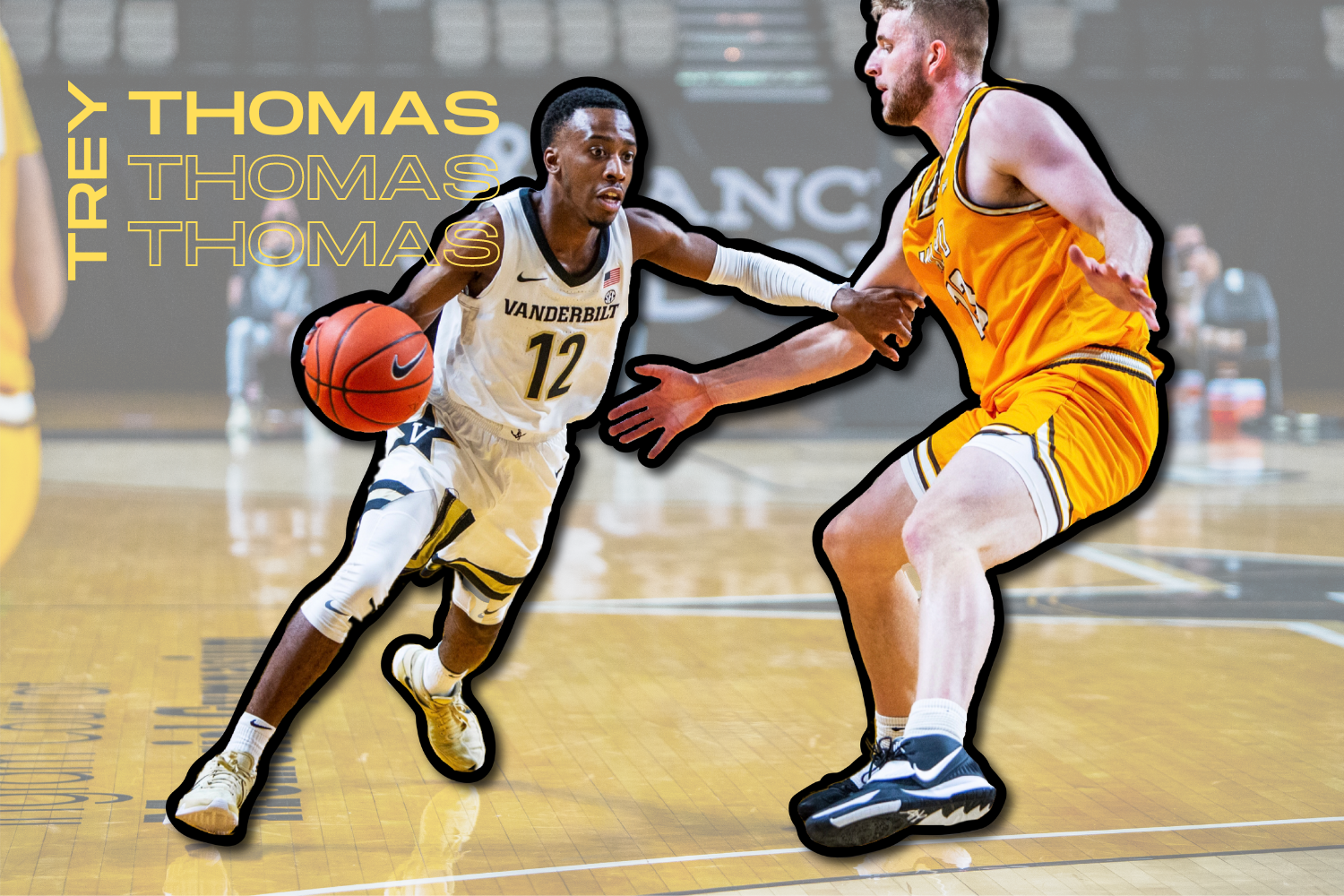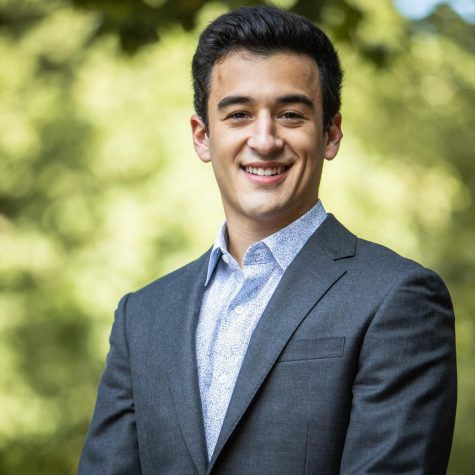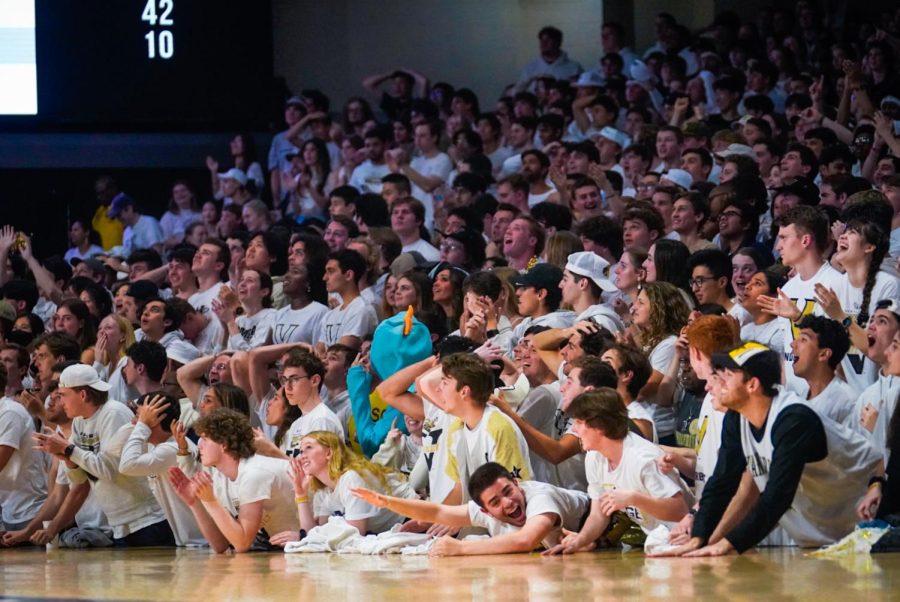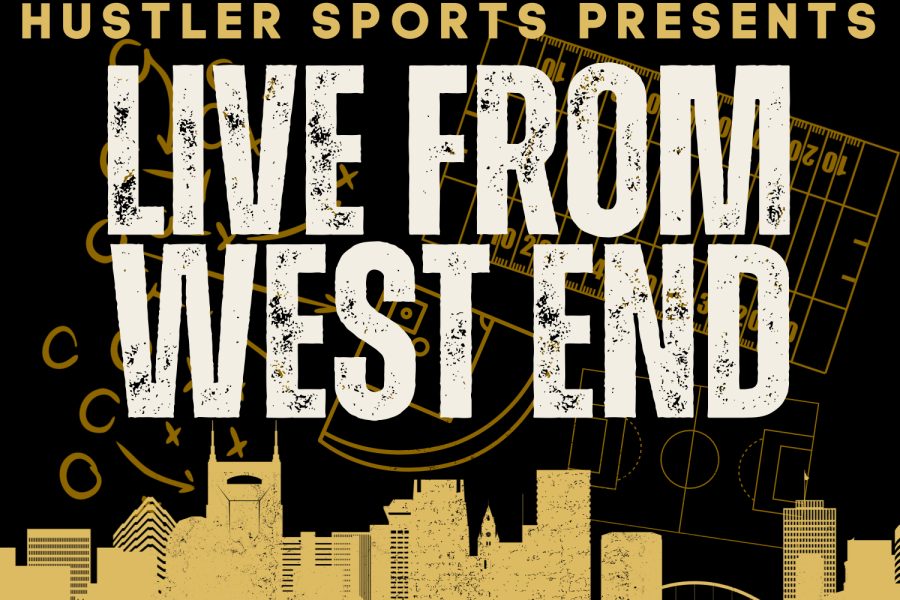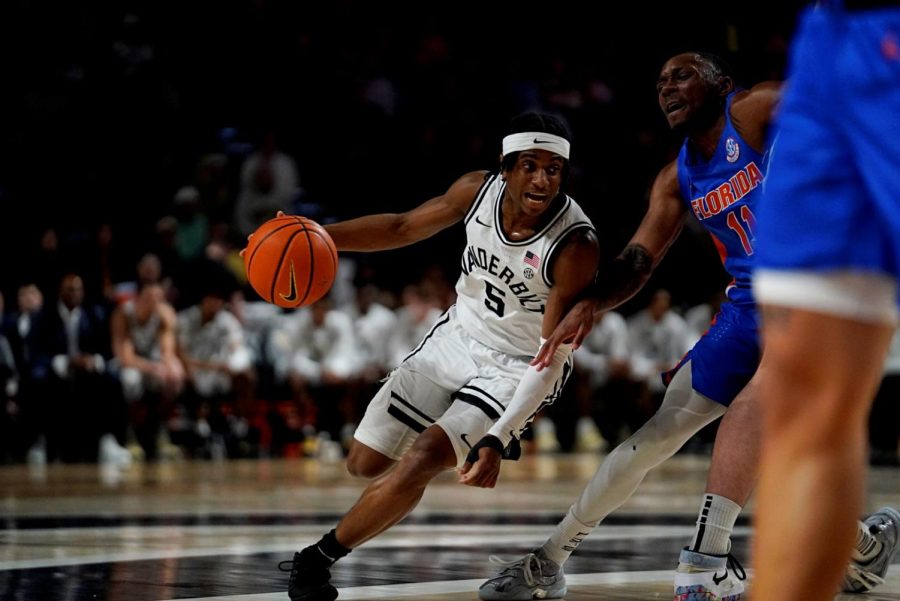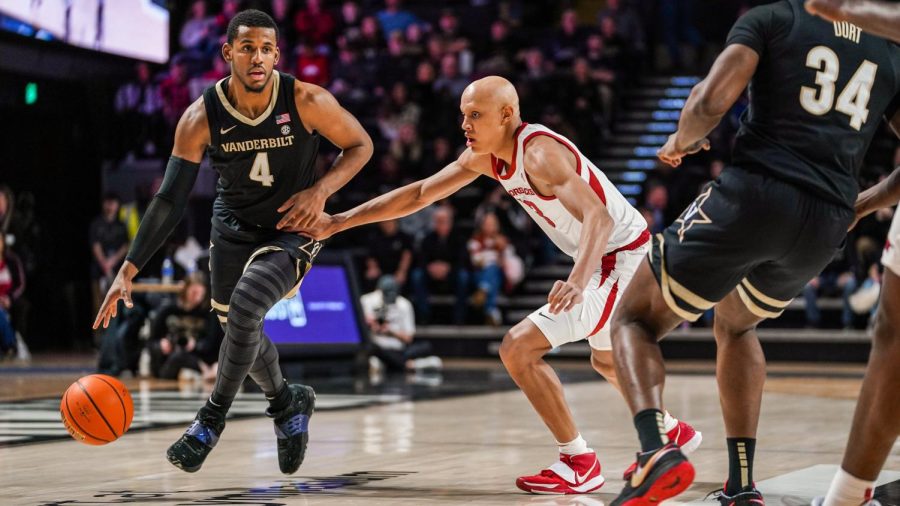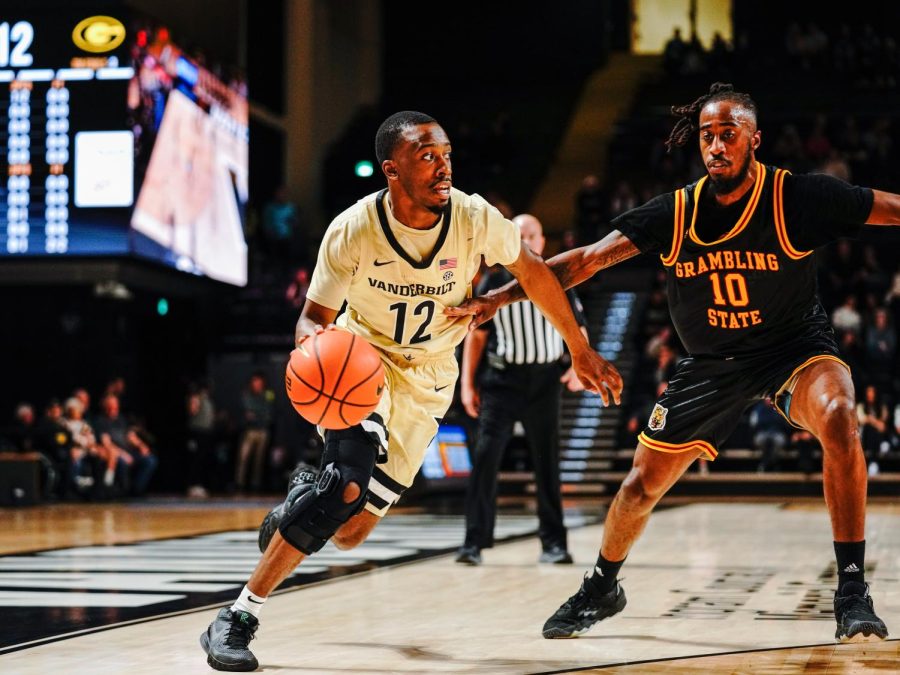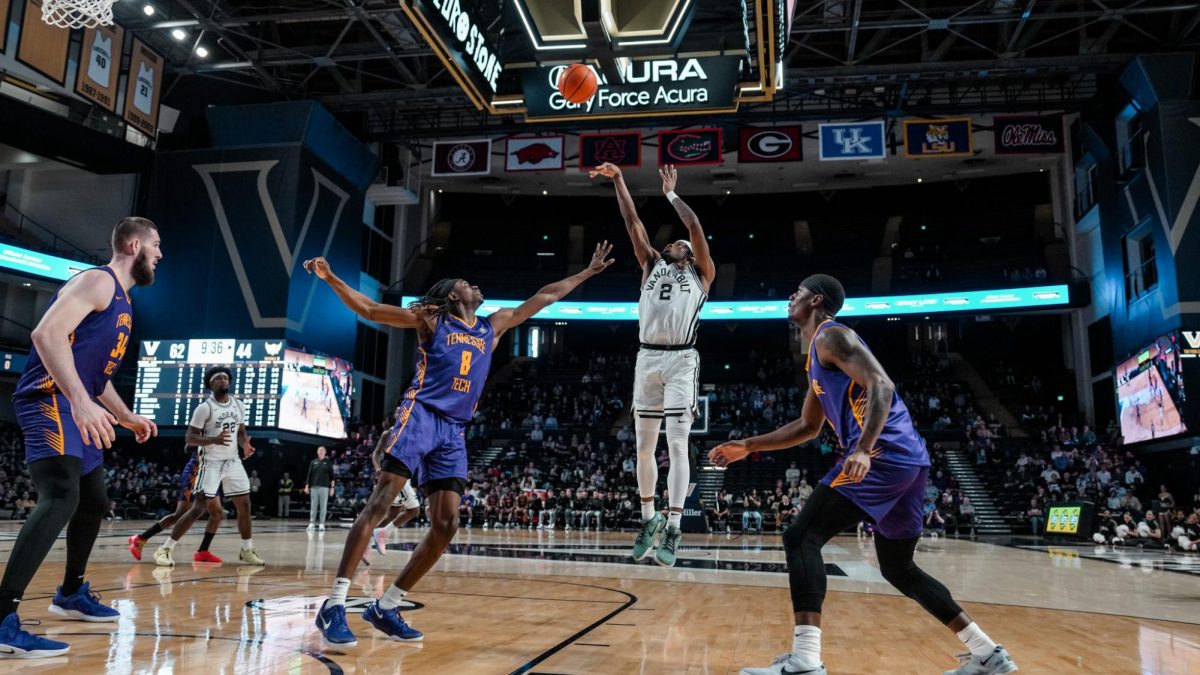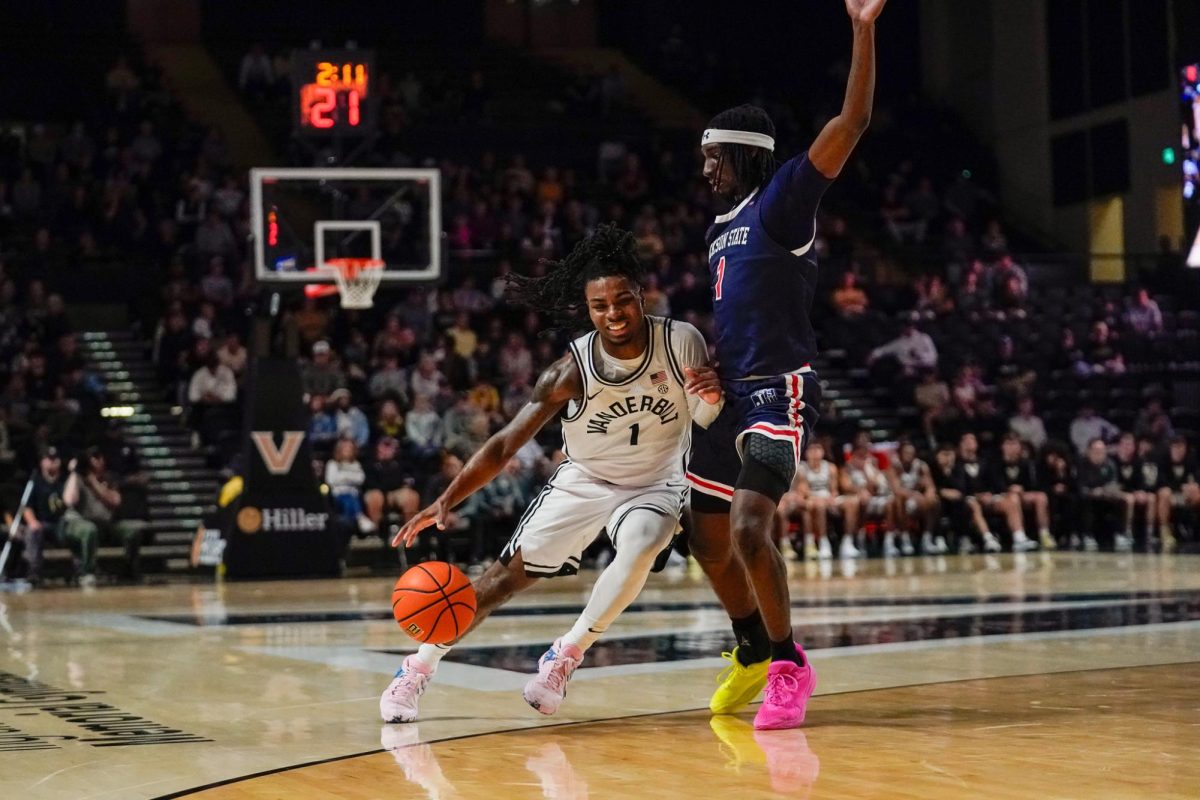Trey Thomas felt the frustration brewing.
A round-shouldered, chest-puffed, confident guard, he typically found himself anchoring Crestwood Prep’s starting five. But not this day. On a cold mid-November afternoon, Thomas instead found himself stoop-shouldered and stone-faced, wearing street clothes as he rode the bench. He sat in anguish. He didn’t want to watch his team play. He had already done enough of that—and it hurt, he says.
One tournament, two exhibition games, zero minutes played. Evidently, that was more painful than the separated shoulder that kept him watching from afar.
“I wasn’t going to let him play,” his coach Ro Russell says. “He was supposed to be out at least two months.”
Thomas was a senior in high school, still doing everything in his power to be recognized by American universities. But the cards were stacked against him: he wasn’t from a basketball town, basketball city or even basketball country; he was from Ontario, Canada. He wasn’t a high-flying, tomahawk-dunking, social media phenom like his younger cousin Elijah Fisher, a five-star guard with offers from just about every blue-chip program in the country; he was a score-first guard who, at the time, “didn’t really have to think about being a pure point guard,” he says.
And the kicker: he didn’t look like much of a basketball player. He was—he is—just 5-foot-11. He weighed 160 pounds, according to the self-reported measurements on his recruiting profile (since his arrival at Vanderbilt, that listing has changed to 165 pounds).
Thomas was supremely talented, sure, holding offers from Yale, UMass and Rice among other mid-majors. Yet the small guard wanted the big stage; Thomas had his eyes set on a Power Five school. But just as he had reached the epoch of his recruiting cycle, he separated his shoulder on an awkward dunk attempt in practice.
“I was just not having it,” Thomas says of the injury. “I was practicing at least, but I was just walking through practice.”
Crestwood Prep was slated to face St. Michael’s College School, and still, Coach Russell had no intentions of playing Thomas. How could he? Not only was Thomas still injured, but Crestwood had an upcoming game against Oak Hill Academy, a talented team that would “maybe [be] worth taking that risk,” Russell says.
Yet, as Russell recalls, before the game, Thomas asked if he could play.
“I just looked at him and laughed,” Russell says. “I was like, ‘No, absolutely not.’”
Thomas tried again.
“‘No, Coach, I’ll be good. I’ll be good,’” Russell recalls Thomas’ last-ditch attempt. “‘I promise I’ll be fine.’”
Unsurprisingly, his promise wasn’t enough. Russell again shot down the plea, this time telling Thomas that he would hear no further rebuttal.
“I turned around,” Russell says. “Didn’t need to hear any more from him. I started talking to the other players about our scouting and our plan for the game.”
Thomas made good by his coach’s command. Half of it, at least. There would be no more rebuttal. He wasn’t going to keep arguing.
He was, however, going to play, whether or not his coach liked it.
“After the talk, I turned back around, and Trey had put on his uniform,” Russell says with laughter. “I’m just like, ‘Yo, what are you doing? I told you once, I told you twice. You’re not playing, so don’t even try it. Just take off your uniform and be my assistant coach today.’”
Thomas didn’t take off the uniform. Instead, he had his teammates plead with Coach Russell, assuring him that Thomas could play without getting in harm’s way. They knew his plan.
At the time, Coach Russell may have rolled his eyes at the idea. But now, as he retells the tale, his eyes glisten with excitement, and a smile extends from ear-to-ear.
Russell gave in, telling his star guard he could play. Thomas, in turn, told Russell his plan.
“He gets in there, and he says ‘Don’t worry, Coach. I’m only going to use my left hand this game,’” Russell says, before responding, “‘Who do you think you are, Larry Bird?’”
Thomas, a righty with a separated right shoulder, played lefty all game—actually, he played lefty for about two or three quarters, until Crestwood found itself winning by roughly 30 points, prompting Russell to pull his starters.
View this post on Instagram
“He had 14 points and six assists. He made two threes, and they were nothing but the bottom of the net,” Russell says, practically yelling over a Zoom call with The Hustler. “He had six assists. Everything was left hand. Left hand floater, left hand pass, one-hand, left-handed rebound, one-hand, left-handed pocket passes, all that stuff. And I was just like ‘Dang.’ But that’s just Trey. Other guys would be like ‘I can’t play, my shoulder is killing me,’ whatever. Not Trey.”
Thomas, an undersized, unranked, overlooked guard, has been doubted his whole life. Scouts, coaches and opponents would write him off, tell him he couldn’t do it or assume he was a stoppable force. On this particular night, it was one of his teammates telling him, “No way you can score with your left,” Thomas recalls.
He just uses it as fuel.
“For the record, I wasn’t at the game,” Thomas’ mother, Karen Grant-Thomas, says to The Hustler. “And I’ll start by telling you that I wouldn’t have let him play if I was at the game. But sometimes, you just can’t get in the way of his love for the game.”
Heart over height
Coach Ro Russell knows talent when he sees it. He’s been coaching at the AAU and high school levels for 33 years. He’s produced numerous NBA players, and as soon as he started coaching Thomas in seventh grade, he knew he had something special.
“Trey was a little ball of fire. He was like five feet tall, 120 pounds, but that didn’t matter. He was the one who hit the last shot, he was the one who took the last charge, got the last rebound, made the last effort. Guys would just look at him and say, ‘Man, I’m going to beat this little guy.’ But when it was all said and done, he was the one that was winning.”
Back then, Thomas says, his size was never the slightest consideration; while most players in the United States may have towered over him, he says the size differential in Canada was minimal. So much so that, in his own words, he “never had to think about being a pure point guard” due to his scoring prowess.
Growing up, Thomas dabbled in soccer, track and field and cross country but eventually fell in love with basketball. Shortly before high school, he had made up his mind: he wanted to go to the United States to play college ball.
His mother was supportive of the idea, but she lacked a thorough understanding of the recruiting scene. So when the process began, she trusted Coach Russell to help select a school that checked all of her boxes—high-level academics, a flourishing city and a student body that supports its student-athletes, among others.
But for the first time in his three-plus-decade coaching career, Coach Russell faced a significant challenge. He knew what Thomas was capable of, and he knew the huge talent that lay within his small frame. Though as he soon learned, only he knew what Thomas was capable of.
College coaches, on the other hand, merely focused on what was on the outside.
“A lot of the assistant coaches and recruiters were looking at him and saying ‘Oh, my coach wants a bigger guard,’ and, you know, ‘We’re used to bigger guards,’ or ‘We have too many guards,’ or ‘I don’t know if he can play at this level.’ And all these different things. They didn’t know what they were talking about.”
Thomas wasn’t just underrated—he was completely unranked. A zero-star recruit. And to this day, that still bothers Russell.
“From the Canadian side, the rankings guys in Canada have never played basketball, never coached, never trained, never reffed,” he says. “So they didn’t know what the ‘it factor’ looks like. They didn’t know that Trey had that ‘it factor.’”
The “it factor” is what made Thomas’ height a non-factor. It allowed him to play lefty. It allowed him, time and time again, to make his opponents look silly.
Russell fondly recalls his Grassroots AAU program playing in the Adidas Gauntlet a few summers ago, where they were matched up with Kevon Looney Elite, the AAU program of the current NBA player. The team was filled with high-major, Division-I-bound players, each one as confident as the next.
They took one look at Trey and wrote him off.
“It started with the Coach,” Russell says. “He was telling his players to terrorize Trey.”
Their coach would yell out commands—only when the ball got to Thomas.
“Force him left!”
“Get up on him. Play him full-court!”
“Turn him, turn him!”
“Body him!”
And of course, Thomas’ favorite, “Get physical, he’s too small!”
“I feel like I’ve always played with a chip on my shoulder, my whole life,” Thomas says. “Hearing in my ear, everywhere I go, that I’m too small, I can’t do this, whatever—that always got me going.”
Thomas exploded.
He’d split the defense, pull a step back, crossover and score with ease. His 44-point, 16-assist performance, capped off with an exclamation, leaning dunk, helped his team cruise to a 20-point win.
View this post on Instagram
Still, despite Thomas’ explosive play, he was hardly gaining recognition at the next level. Programs continued to pass up on the Canadian guard due to his size.
That, in turn, continued to motivate Thomas. He wanted to make them regret the decision.
“Trey has a little bit of Napoleon’s Complex, you know what I’m saying? He would rather have it that way,” Russell says. “Trey would rather be that dude that shows you that even though I’m smaller than you, I can still take you out. And all these coaches, man, I tried to tell them.”
Along came Vanderbilt
By the time his senior season rolled around, Thomas had a few mid-major offers, but he had yet to receive that coveted call from a Power Five coach. Russell told Thomas he had two options: take one of the outstanding offers, or roll the dice and hope for a high-major.
Trey opted for the latter. Then, of course, COVID-19 hit, preventing him from visiting schools and coaches from coming to his games.
“COVID was a challenge, but I feel like at the same time it was a blessing in disguise,” Thomas says. “Because it allowed me to wait it out and not rush it, which is when Vanderbilt came into the mix.”
He waited and waited and waited—spring passed, and he still hadn’t received the offer.
“As a mom, it was like—I saw Yale, and it was just—I was like, ‘What are we talking about?!’” Karen says through laughter. “No brainer for me, why are we still having this conversation? But that’s not where his heart was. And I trusted him.”
During the shutdown, Coach Russell had time to think: with coaches now unable to come see him play, which programs have already seen Thomas in action?
He immediately remembered Vanderbilt head coach Jerry Stackhouse, who came to a scrimmage earlier that fall. Though Stackhouse came with intentions of recruiting Thomas’ younger cousin, Elijah Fisher, he instead saw Thomas dominate the scrimmage.
“I called Coach Stackhouse and asked if he remembered coming to our scrimmage,” Russell says. “He told me, ‘You know I love Elijah Fisher, and you had some good young guys.’”
Russell tried jogging Stackhouse’s memory.
“Remember that small guard you saw? You came up to me and were like, ‘Wow, that kid has some spark. That kid can go.’ So I sent him some of Trey’s tapes.”
The process was slow, but Stackhouse remained intrigued. Assistant coaches were in contact with Thomas, his family and Coach Russell, asking for transcripts, film and more. At that point, Karen was sold.
“The assistant coaches had a level of professionalism that stood out,” she says. “I am big on the aspect of family. I want to feel the community aspect; I want to know they care about my son. And they did. They cared about him and me. Through that process, they took notes on what I had to say in our conversations, and I could tell because in our next talk, they would ask very specific follow-up questions based on what I had said. They wanted to make sure I was very comfortable.”
Eventually, when the offer came, it came late—so late that Thomas had already graduated high school. In mid-July, after months of waiting with uncertainty, after years of being told he’d never make it to a Power Five school, Thomas received the offer that, in his words, “was just everything I wanted in a school.”
The academics were strong, the city was unique and the program, he says, excited him because of the NBA-level coaching staff. So he committed to Vanderbilt, then enrolled a mere few days after.
Yet, the skeptics remained. Commodore fans were confused. Why did Stackhouse land a commit so late in the process? Furthermore, why did Stackhouse offer an unranked guard?
Why did Stackhouse have any interest in a 5-foot-11 guard?
“He will always keep that dog-eat-dog mentality because nothing is going to be handed to you in life,” Karen says. “He’s come from a home where he realizes nothing has been handed to him. He knew he had to earn respect.”
Thomas has done just that. While many expected him to be a non-factor, the undersized guard, now playing against the top athletes in the country, has started two of the 13 games in which he’s appeared. He’s averaging 19 minutes per game, and in the beginning of the season, he showed off his knack for three-point shooting. Still, he’s unsatisfied.
His hot start to the season has since slowed down, and his production from deep has curtailed. Thomas told The Hustler that there’s only one way to solve his slump: being the first one in the gym and the last one out, putting up hundreds of extra shots every day.
For those surprised with Thomas’ production to date, just know that this is only the beginning. The more you doubt him, the more he’ll perform.
“Guess what? He’s not done yet. Not even close. He’s the most coachable player I know, so Stackhouse is going to take advantage of that. You can speak anything into existence with him,” Russell says. “This is just the beginning. So, stay tuned.”
Russell adjusts the camera angle of his Zoom, revealing his smirk, then adds, “I just want to expose the fact that a lot of these scouts—they’ve got to brush up their skills. I tried to tell them, man.”


